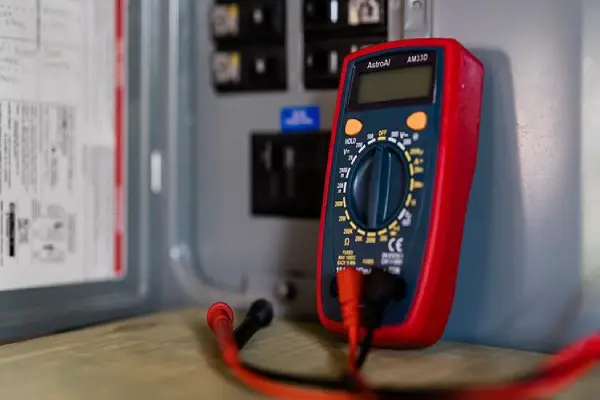
Mr. Electric explains how to test a circuit breaker with a multimeter for safety and functionality.
|
All Mr. Electric franchises are locally owned and operated and may offer fewer or more services than those listed here. To learn more about the circuit breaker services offered in your area, contact the Mr. Electric nearest you for details or a customized on-site assessment.
Just have a couple of quick questions? Jump to our quick FAQs
- Why should I test my circuit breaker with a multimeter?
- How do I know if my circuit breaker is bad?
- What does a multimeter test entail?
- What does a multimeter reading of 0V mean?
- Is it safe to test a breaker myself?
- How often should I have my circuit breaker tested?
- Can a faulty breaker increase my electricity bill?
- How can Mr. Electric help with circuit breaker issues?
A broken circuit breaker increases the risk of an electrical overload occurring in your home. An overload can cause a short circuit to occur, breaking your devices and appliances. In extreme cases, electrical shorts can even pose a fire risk.
Testing a circuit breaker is necessary to determine the flow of electricity in a circuit breaker panel. The most efficient way to test a circuit breaker is with a multimeter. A multimeter is an instrument that combines several measurement functions in one unit to provide useful readings. Multimeters can measure volts, amps, and ohms through outlets, fixtures, and breakers, making them an important tool for any aspiring electrician.
If you’ve recently purchased a multimeter to carry out basic electrical work, or are just curious about how these important devices work, read on. We’ll explain how electricians use multimeters to test and replace circuit breakers.
Testing a Circuit Breaker with a Multimeter
Here are the steps an electrician will follow to test your circuit breaker with a multimeter:
- First, the electrician will make sure the area around the electrical panel is dry. If there is any standing water on the ground, the service professional will mop it up before opening the electrical panel.
- To check a breaker with a multimeter, the electrician will open the circuit breaker box and determine which breaker will be tested.
- The electrician will then turn off all lights and appliances that are being powered through the circuit breaker being tested.
- The AC volts setting (usually abbreviated “ACV”) is the multimeter setting the service technician will use to test the circuit breaker.
- They will touch one prong of the multimeter to the breaker’s terminal screw and touch the other prong to a ground screw. The ground screw is usually located in a metal bar along the right-hand side of the electrical panel.
- Once these prongs are connected, the readout on the multimeter will display the potential voltage at the breaker position.
- If the reading is zero, then the breaker is faulty and need to be replaced.
Because circuit breakers and electrical panels pose a lethal shock risk, only a licensed electrician should test, diagnose, or service your circuit breakers!
.webp)
Contact Mr. Electric for Circuit Breaker Service
Testing a circuit breaker to see if it is bad isn’t a task suitable for everybody. If you suspect your circuit breaker has any kind of problem, it’s worth getting a professional opinion. Call Mr. Electric® today and have any necessary repair completed on the spot.
FAQs About Testing a Circuit Breaker with a Multimeter
The safety of you, your family, and your home is the top priority of every Mr. Electric service professional. Our commitment to safety includes meticulous attention to detail in every job. We also leverage our years of experience to answer your questions. Below are answers to some of the most frequently asked questions about how to test a circuit breaker.
Why should I test my circuit breaker with a multimeter?
If your lights flicker or appliances suddenly stop working, you might have a faulty breaker. Knowing how to test a circuit breaker can help prevent power failures and fire hazards. If your breaker needs attention, your local Mr. Electric team can help. Learn more about our circuit breaker repair services!
How do I know if my circuit breaker is bad?
Common warning signs of a failing breaker include frequent tripping, a burning smell, or a breaker that won’t reset. If you’re unsure how to test a breaker, schedule a professional multimeter test to determine if it needs replacement. Our residential electrical services include multimeter testing and circuit breaker repair.
What does a multimeter test entail?
When you schedule a professional multimeter test, your local Mr. Electric professional will arrive equipped with:
- A digital multimeter
- Insulated gloves
- Safety goggles
- A flashlight (for dark electrical panels)
The multimeter test itself involves three steps:
- The multimeter is set to AC voltage mode.
- The black probe is placed on the panel’s ground bar.
- The red probe is touched to the breaker terminal.
The display will indicate the voltage, allowing your electrician to determine the status of your circuit breaker.
What does a multimeter reading of 0V mean?
A working breaker should read around 120V (single-pole) or 240V (double-pole). If the multimeter shows 0V, your breaker might be tripped, faulty, or not receiving power. A licensed electrician can assess whether a reading of 0V means you need a circuit breaker replacement or an electrical panel upgrade.
Is it safe to test a breaker myself?
All electrical equipment, including circuit breakers and panels, pose a lethal shock risk. Only a licensed electrician should test a circuit breaker. Call your local Mr. Electric team to schedule a convenient multimeter test. Not only do our highly trained professionals know how to test a circuit breaker safely, but they can also provide insights and recommend repair or replacement to ensure safe and reliable operation in the future.
How often should I have my circuit breaker tested?
It’s a good idea to have your breakers checked at least once a year, especially in older homes. Regular testing can prevent unexpected power outages and improve home safety. If you notice flickering lights or unusual tripping, it’s time to schedule a circuit breaker test.
Can a faulty breaker increase my electricity bill?
Yes! A malfunctioning breaker can lead to unnecessary energy loss or short circuits, which can drive up costs. If you’re noticing higher electricity bills, a quick inspection by your local Mr. Electric team could help you save money.
How can Mr. Electric help with circuit breaker issues?
Your local trained, insured, and bonded Mr. Electric service professionals specialize in diagnosing and fixing electrical issues. We’re so confident in our services that we back every job with the Neighborly Done Right Promise® to ensure your satisfaction. We also offer the Mr. Electric Advantage Plan® to make regular electrical check-ups and service even more convenient. If your breaker is acting up, contact your local Mr. Electric team today to schedule service!
This blog is made available by Mr. Electric for educational purposes only to give the reader general information and a general understanding on the specific subject above. The blog should not be used as a substitute for a licensed electrical professional in your state or region. Check with city and state laws before performing any household project.
